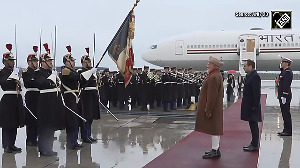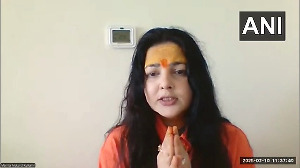As on March 2, 2006, India is not accorded the status of a Nuclear Weapons State nor is India in the list of 'non-nuclear' states.
India is somewhere in between. This is the outcome of President George W Bush's visit to New Delhi. The United States has officially acknowledged that India is a special case when it comes to nuclear proliferation. This happened when Bush and Prime Minister Manmohan Singh agreed on the nuclear separation plan on Thursday. India's impeccable record in non-proliferation over the last four decades was acknowledged and rewarded in a big way. The Indian government has been insisting for many months that this separation plan has nothing to do with India's strategic nuclear programme. After Thursday's agreement, government sources claim that nothing stops India from adding strength to India's strategic programme. India and the United States moved one firm step forward to eventually signing the ambitious Indo-US Nuclear Energy Cooperation Agreement, a high-level source in the government said on Thursday. After the agreement, Dr Singh told this correspondent at the press conference at Hyderabad House, "Now it is for the United States to go to the US Congress for necessary amendments in US laws. Also, the US will approach members of the Nuclear Suppliers Group and thereafter we'll go to the International Atomic Energy Agency for India-specific safeguards." What kind of separation plan is Bush taking to Washington for Congressional approval? The government source said the negotiations were tough and difficult. A lot of effort was put in to take care of India's worry about the reliability of continuous supply of nuclear fuel and also about future nuclear energy power plants that India may build, he said. Dr Singh has said he will release the details of the separation plan in Parliament but a high-level government source gave rediff.com the broad contours of the nuclear separation plan, given by India to the US and agreed by both. Some highlights: Sources claim that what happened with the Tarapur Atomic Power Station near Mumbai where the supply of nuclear fuel was discontinued abruptly will not happen again, and that it is not such a bad deal to let have a 'safeguards in perpetuity' clause.
After all, India is not a signatory to the nuclear Non-Proliferation Treaty so Indian negotiators had plenty of issues that could have been possible deal breakers. Even after the deal, if fuel supply to any of nuclear plants is discontinued, India will have the right to help itself out. If one partner is not ready then another partner can help India out. These assurances will be 'in- built' in the final agreement. The historic negotiations were conducted by a team lead by Foreign Secretary Shyam Saran. On his team were two nuclear scientists from the Department of Atomic Energy, members of the National Security Council, serving diplomats and strategic weapons experts. Government sources claims that Thursday's understanding with the US unlocks the nuclear regime and will give India access to dual technology with huge advantages to India. But this is not a done deal yet. That will happen only after the US Congress approves it and changes US laws. India has agreed to separate its nuclear plants by 2014. Now that the Bush administration has found India's separation plan to be workable, India hopes President Bush will put his weight behind it to get it approved by the US Congress. Dr Singh will share the same plan with Parliament. After July 18, 2005, the US had not fully delivered its side of the commitment. India is now hopeful that parallel actions will be on and the Nuclear Suppliers Group will also issue India specific guidelines after the US Congress seals the deal. Lastly, sources in Indian government maintain that the views of India's nuclear scientists were respected throughout the negotiations and 'red lines' were drawn keeping their demands in mind. Complete coverage:






 © 2025
© 2025